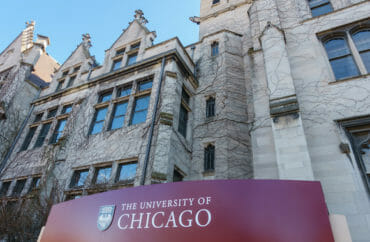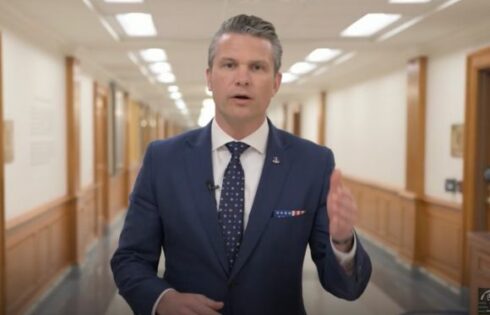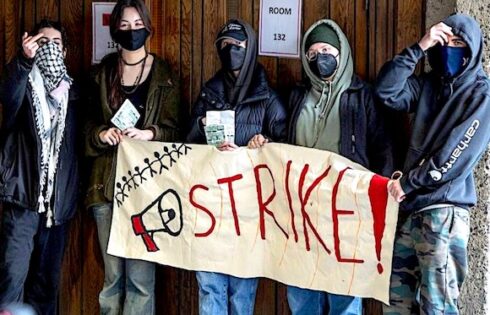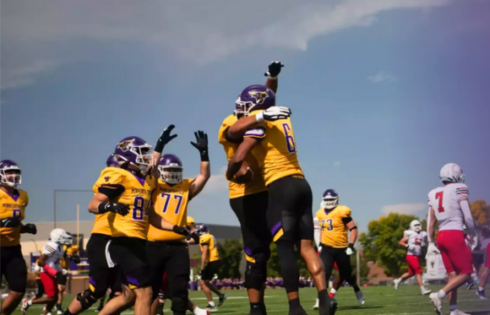
University denies activist claims that it has ‘ties to slavery’
Claiming that the University of Chicago is founded on free slave labor, student groups there recently held a “teach-in” arguing that the university owes some of its black students slavery reparations.
The event continued to advance pressure on the prestigious private school to offer such restitution, lobbying that included a “Rally for Reparations” late last year, which included calls for “reparations” for African American community members in the South Side of Chicago, where the university is located.
At the late February teach-in, the groups Reparations at UChicago, the UChicago Socialists and UofC Resists, the organizers of the event, were joined by representatives from a graduate student union and a local Black Lives Matter chapter, as reported by The Chicago Maroon.
The demands cite the founding of the original University of Chicago in 1856 on land donated by Stephen Douglas, who purchased the property using profits from his Mississippi slave plantation. But University of Chicago leaders insist the institution is a functionally different entity from the original university.
At the “teach-in,” in addition to calling for “compensating damages from slavery,” attendees also seek a “community benefits agreement” from the university “as a way of making indirect reparations to the South Side community,” according to The Maroon.
Community benefits agreements require developers to adhere to certain community stipulations before proceeding with a real estate project. Many South Side residents and community activists are currently furious over the plans for the Obama Presidential Center, which will swallow up a large chunk of a beloved South Side park, and they partly blame University of Chicago officials for the mess.
In a telephone interview with The College Fix, Obari Cartman, a panelist at the “teach-in” and the president of the Chicago Chapter of the Association of Black Psychologists, described the reparations that the agreement would seek, including increased educational opportunities, allocation of resources and skills, more land, and a student loan repayment system.
The exact reparations, Cartman said, are “to be determined and in progress.” Activists, he said, will be in conversation with university officials to “find ways that infrastructure and community resources that the University has access to could be used to meet the needs of some of the descendants of African American families.”
Cartman told The Fix that he recently journeyed to Douglas’s plantation in Mississippi in search of old records on Douglas’s slaves. He wishes to locate the descendants of those slaves so they may benefit from the reparations.
In an article authored by Reparations at UChicago last May, the group claims the University of Chicago “does not exist apart” from its ties to slavery.
“Slavery…provided [Stephen Douglas] with the financial security and economic power to donate ten acres of land (valued at over $1.2 million in today’s dollars) to start the University of Chicago in 1857,” states the article, published by the African American Intellectual History Society.
“This founding endowment, drenched in the blood of enslaved African Americans, was leveraged by the University of Chicago to borrow more than $6 million dollars in today’s terms to build its Gothic campus, its institutional structures, its organizational framework, its vast donor network, and an additional $4 million endowment before 1881. In short, the University of Chicago owes it entire presence to its past with slavery,” the article continues.
The university strongly denies it is in any way connected with the Douglas’s slave labor.
“The current University of Chicago, founded in 1890, had no financial or legal relationship with the ‘first’ University of Chicago, which was founded in 1856-57 and collapsed in 1886 in a state of debt and foreclosure,” university spokeswoman Marielle Sainvilus told The College Fix in an email.
“The new university did not use or benefit from the shuttered institution’s land or its endowment,” she added.
With the exception of Cartman, none of the organizations or persons involved with this advocacy group or CBA responded to requests for comment to The College Fix.
The recent teach-in, held late last month, followed calls for reparations at the University of Chicago from last fall. Last semester, Reparations at the University of Chicago partnered with the National Coalition of Blacks for Reparations in America to demand that the university “make amends for its founding ties to slavery.”
N’COBRA also demanded that Chicago establish a “truth and reconciliation committee that would produce a comprehensive reparations program” and that the city of Chicago “void all its contracts with the University until it complies with the ordinance and addresses the RAUC’s demands.”
MORE: Georgetown works with slave descendants group amid demands for cash reparations
MORE: University president: NO slavery reparations despite student gov. resolution
IMAGE: Jannis Tobias Werner / Shutterstock.com
Like The College Fix on Facebook / Follow us on Twitter






Please join the conversation about our stories on Facebook, Twitter, Instagram, Reddit, MeWe, Rumble, Gab, Minds and Gettr.